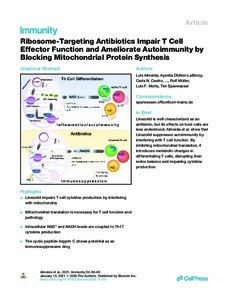Ribosome-Targeting Antibiotics Impair T Cell Effector Function and Ameliorate Autoimmunity by Blocking Mitochondrial Protein Synthesis
Almeida Luis; Dhillon-LaBrooy Ayesha; Castro Carla N; Adossa Nigatu; Carriche Guilhermina M; Guderian Melanie; Lippens Saskia; Dennerlein Sven; Hesse Christina; Lambrecht Bart N; Berod Luciana; Schauser Leif; Blazar Bruce R; Kalesse Markus; Muller Rolf; Moita Luis F; Sparwasser Tim
Ribosome-Targeting Antibiotics Impair T Cell Effector Function and Ameliorate Autoimmunity by Blocking Mitochondrial Protein Synthesis
Almeida Luis
Dhillon-LaBrooy Ayesha
Castro Carla N
Adossa Nigatu
Carriche Guilhermina M
Guderian Melanie
Lippens Saskia
Dennerlein Sven
Hesse Christina
Lambrecht Bart N
Berod Luciana
Schauser Leif
Blazar Bruce R
Kalesse Markus
Muller Rolf
Moita Luis F
Sparwasser Tim
CELL PRESS
Julkaisun pysyvä osoite on:
https://urn.fi/URN:NBN:fi-fe2021042824803
https://urn.fi/URN:NBN:fi-fe2021042824803
Tiivistelmä
While antibiotics are intended to specifically target bacteria, most are known to affect host cell physiology. In addition, some antibiotic classes are reported as immunosuppressive for reasons that remain unclear. Here, we show that Linezolid, a ribosomal-targeting antibiotic (RAbo), effectively blocked the course of a T cell mediated autoimmune disease. Linezolid and other RAbos were strong inhibitors of T helper-17 cell effector function in vitro, showing that this effect was independent of their antibiotic activity. Perturbing mitochondria! translation in differentiating T cells, either with RAbos or through the inhibition of mitochondria! elongation factor G1 (mEF-G1) progressively compromised the integrity of the electron transport chain. Ultimately, this led to deficient oxidative phosphorylation, diminishing nicotinamide adenine dinucleotide concentrations and impairing cytokine production in differentiating T cells. In accordance, mice lacking mEF-G1 in T cells were protected from experimental autoimmune encephalomyelitis, demonstrating that this pathway is crucial in maintaining T cell function and pathogenicity.
Kokoelmat
- Rinnakkaistallenteet [29337]
